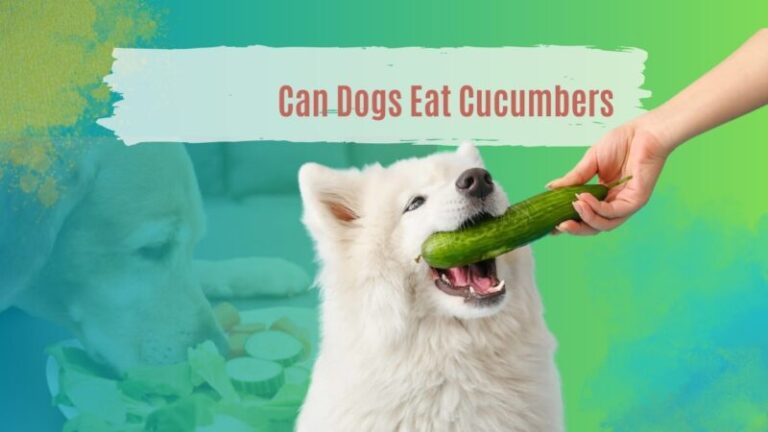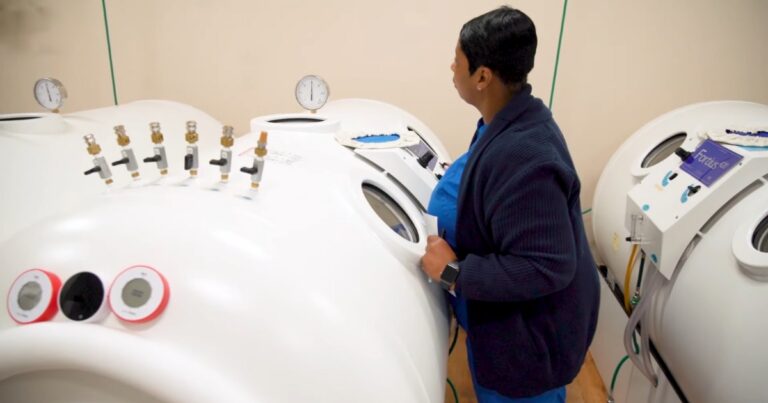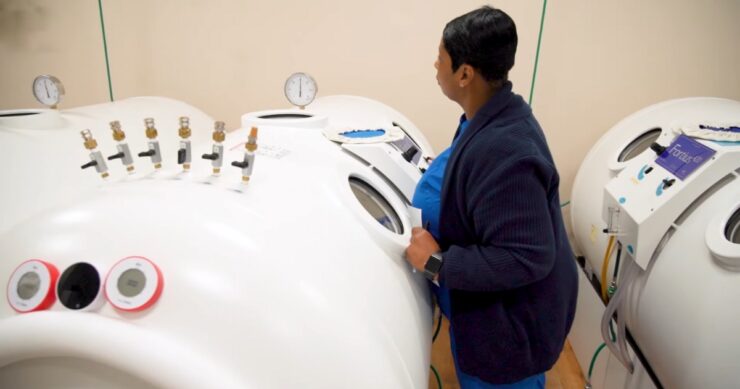As pet owners, we often wonder about the types of foods we can safely share with our little friends. One question that frequently arises is, “Can dogs eat cucumbers?” This is a valid question, considering that these are a common household vegetable and a staple in many of our diets.
Dogs have different digestive systems and nutritional needs compared to humans, and not all foods that are safe for us are safe for them. Therefore, it’s essential to do our research before introducing new foods into our pet’s diet.
Today we will discuss the nutritional value of these vegetables, whether they are safe, the potential health benefits and risks, and how to properly prepare cucumbers for our pets. We will also touch on the possibility of cucumber allergies and discuss alternative healthy snack options.
Is it Safe?
The good news for us dog owners is that cucumbers are safe for them to eat. They are non-toxic and pose no significant health risks when fed in moderation.
However, as with any new food, it’s important to introduce them into your pet’s diet gradually to monitor for any adverse reactions. It’s important to consider the size and breed of your puppy.
Small canines or those with a history of choking may have difficulty eating large pieces of cucumber.
Health Benefits
Cucumbers are a hydrating snack that can be particularly beneficial for dogs, especially during the hot summer months. They are composed of about 95% water, which can help keep your pet hydrated and cool. This is particularly beneficial for canines that are active or those that don’t drink enough water.
Hydration is crucial as it aids in digestion, nutrient absorption, and maintaining a normal body temperature. In addition to being hydrating, these vegetables are also low in calories and fat, making them an excellent treat for puppies that are overweight or on a diet.
Obesity can lead to a host of health problems, including diabetes, heart disease, and joint issues. Therefore, finding low-calorie treats like this vegetable can be a great way to reward your puppy without contributing to weight gain. They can be used during training sessions as a healthy reward or as a crunchy, satisfying addition to your pet’s regular meals.
Beyond hydration and weight management, cucumbers also offer nutritional benefits. They contain essential vitamins and minerals that can contribute to dog’s overall health. For instance, they are a good source of Vitamin K, which plays a key role in blood clotting. This means it helps your pet’s blood to clot properly, which is crucial in case of injury.
They also contain Vitamin C, an antioxidant that can help boost your pet’s immune system, protecting them from disease. While dogs can produce Vitamin C on their own, additional sources can help support their overall health.
How to prepare them?
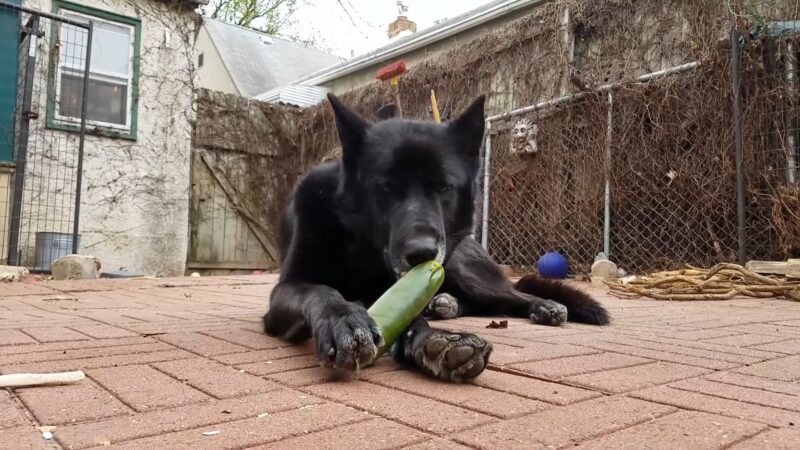
When preparing this delicious snack for your pet, it’s important to keep a few things in mind. First, always wash the vegetable thoroughly to remove any pesticides or chemicals that may be on the skin. If possible, choose organic vegetables to minimize exposure to these substances.
Next, cut it into small, bite-sized pieces that are appropriate for your pet’s size. This can help prevent choking, especially in small dogs or canines that tend to gulp their food. If your puppy has never eaten this vegetable before, start with a small amount to see how they react.
It’s also important to feed the vegetables plain, without any seasonings, dressings, or additives. While these may make the vegetable more appealing to us, many seasonings and dressings can be harmful to dogs. For instance, high-fat dressings can contribute to obesity and other health problems.
Allergies and Sensitivities
While cucumber allergies are rare in dogs, they can occur. If your pet has never eaten this vegetable before, it’s important to start with a small amount and monitor for any signs of an allergic reaction. These can include symptoms such as itching, hives, swelling, difficulty breathing, or gastrointestinal upset.
In addition to allergies, some dogs may have a sensitivity to the vegetable. This can result in gastrointestinal upset, such as diarrhea or vomiting. If your pet shows any signs of discomfort or illness after eating it, it’s best to discontinue feeding it and consult with your veterinarian.
It’s also worth noting that while the flesh of the cucumber is safe for dogs, the seeds can sometimes cause an upset stomach. If your puppy has a sensitive stomach, you may want to remove the seeds before feeding the vegetable.
Other Considerations

Before feeding cucumbers to your dog, it’s important to consider their overall health and dietary needs. For instance, if your pet has a medical condition that requires a specific diet, or if they are on medication that could interact with certain foods, it’s best to consult with your veterinarian before introducing new foods.
Age is another factor to consider. Puppies have different nutritional needs than adult dogs, and senior dogs may have dietary restrictions due to health conditions. Always consult with your veterinarian to ensure that these vegetables are a safe and beneficial addition to your pet’s diet.
Lastly, remember that every pet is unique, what works for one may not work for another. Always monitor your pet’s reaction to new foods and adjust their diet accordingly.
Alternative Healthy Snack Options
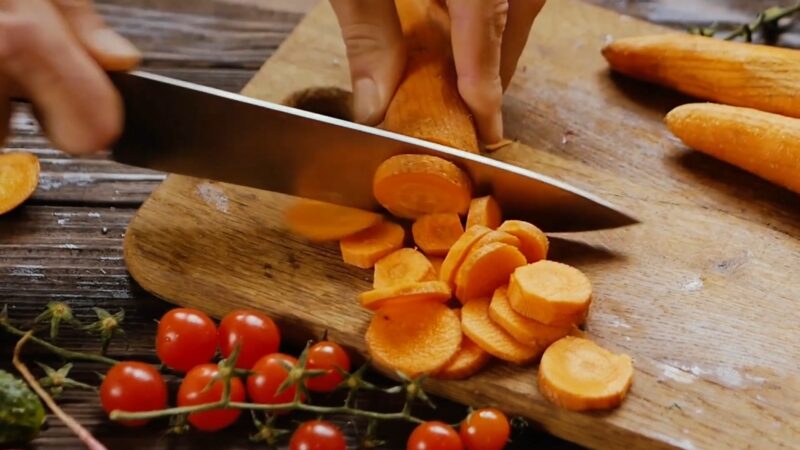
While cucumbers can be a great snack for many dogs, not all pets may enjoy them or be able to eat them due to allergies or sensitivities. If this is the case, there are plenty of other healthy snack options available that are also safe for them.
For instance, carrots are a crunchy snack that many enjoy, and they’re packed with beneficial nutrients like beta-carotene and fiber. Apples (without the seeds) can also be a refreshing and hydrating treat, offering a good source of vitamins A and C.
Blueberries are antioxidant-rich fruits that can be a sweet treat for your pet, while sweet potatoes are a good source of dietary fiber and contain a range of vitamins and minerals.
Start by offering small amounts of the new food and gradually increase the quantity over several days or weeks.
It’s also crucial to remember that these snacks should not replace a balanced, nutritionally complete dog food. Treats and snacks should make up no more than 10% of your pet’s daily caloric intake. Lastly, always ensure that the fruits and vegetables you offer your pet are safe for canine consumption.
Some fruits and vegetables, such as grapes, onions, and garlic, are toxic to them. If you’re ever unsure about a particular food, it’s best to consult with your veterinarian. They can provide guidance based on your pet’s specific dietary needs and health status.
Signs of Digestive Issues
If your dog eats cucumber and experiences digestive upset, it’s crucial to recognize the signs and seek veterinary care if necessary. The most common signs of digestive issues include vomiting and diarrhea.
These symptoms may occur if your pet eats too much vegetable at once or if they have a sensitive stomach. In addition to vomiting and diarrhea, other signs of digestive upset can include a loss of appetite and lethargy.
If your puppy is refusing to eat, seems unusually tired, or shows any other changes in behavior after eating the vegetable, these could be signs of a more serious issue. It’s also important to note that while cucumbers are low in calories and fat, they do contain fiber, which can cause gas and bloating in some dogs.
If your pet shows any of these signs, it’s important to discontinue feeding it. Your vet can examine your pet, determine the cause of their symptoms, and recommend an appropriate treatment plan.
FAQs:

Can these vegetables help with a dog’s bad breath?
Yes, chewing on cucumber slices may help freshen your pet’s breath temporarily.
Are they safe for puppies with kidney issues?
Generally, they are safe due to their high water content, but it’s important to consult with a veterinarian for specific dietary recommendations.
Can pets eat cucumber leaves or stems?
It’s best to avoid leaves or stems, as they can be difficult to digest and may cause digestive issues.
Should pickles also be consumed?
Pickles often contain high levels of salt and other ingredients that can be harmful to dogs, so it’s best to avoid feeding them pickles.
Can the vegetable slices be frozen?
Yes, frozen slices can provide a refreshing and crunchy treat, especially during hot weather.
Final words
In conclusion, cucumbers can be a safe and healthy treat for dogs when fed in moderation. They offer several health benefits, including hydration and low-calorie content, making them a good treat option for overweight pets.
My golden retriever loves these vegetables! In our home, this is a delicious snack for all of us, both humans and dogs!
However, when introducing new foods into your pet’s diet, it’s best to consult with your veterinarian. They can provide personalized advice based on your pet’s age, health condition, and dietary needs.
Always take care that your precious puppy stays happy and healthy!
Related Posts:
- Why My AC Is Not Cooling: Tips for Troubleshooting…
- UberEats Age Dilemma: Can You Start Delivering at…
- AI Unveiled: Surprising 9 Things You Probably Didn't…
- Can Artificial Intelligence Forecast RNG in Slot…
- Can a Foreigner Open a Company in the UK? Tips for a…
- Can Novak Djokovic Achieve the Golden Slam in 2024?…

